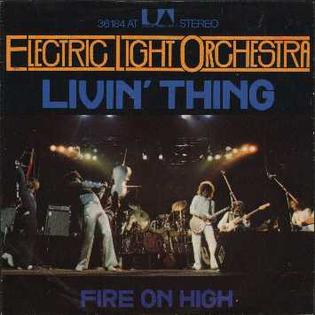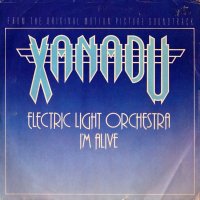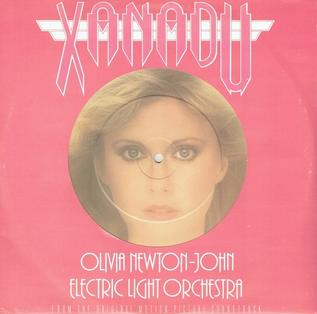
The Electric Light Orchestra (ELO) are an English rock band formed in Birmingham in 1970 by songwriters and multi-instrumentalists Jeff Lynne and Roy Wood with drummer Bev Bevan. Their music is characterised by a fusion of pop and classical arrangements with futuristic iconography. After Wood's departure in 1972, Lynne became the band's sole leader, arranging and producing every album while writing nearly all of their original material. During their first run from 1970 to 1986, Lynne and Bevan were the group's only consistent members.

Out of the Blue is the seventh studio album by the British rock group Electric Light Orchestra (ELO), released on 24 October 1977 in the United States and four days after in the UK on 28 October. Written and produced by ELO frontman Jeff Lynne, the double album is among the most commercially successful records in the group's history, selling about 10 million copies worldwide by 2007.

Discovery is the eighth studio album by English rock band Electric Light Orchestra (ELO). It was released on 1 June 1979 in the United Kingdom by Jet Records, where it topped record charts, and on 8 June in the United States on Jet through Columbia Records distribution. A music video album featuring all the songs being played by the band was then released on VHS in 1979, then re-released as part of the Out of the Blue: Live at Wembley DVD and VHS in 1998.

"Livin' Thing" is a song written by Jeff Lynne and performed by Electric Light Orchestra (ELO). It appears on ELO's 1976 album A New World Record and was also released as a single. Patti Quatro sang uncredited vocals, particularly the "higher and higher" parts.

"Strange Magic" is a song written by Jeff Lynne and performed by Electric Light Orchestra (ELO). It was originally released on their 1975 Face the Music album.

"Mr. Blue Sky" is a song by the Electric Light Orchestra (ELO), featured on the band's seventh studio album Out of the Blue (1977). Written and produced by frontman Jeff Lynne, the song forms the fourth and final track of the "Concerto for a Rainy Day" suite on side three of the original double album. "Mr. Blue Sky" was the second single to be taken from Out of the Blue, peaking at number 6 in the UK Singles Chart and number 35 in the US Billboard Charts.

"Do Ya" is a song written by Jeff Lynne, that was originally recorded by The Move, which became a hit for the Electric Light Orchestra in 1977.

"Turn to Stone" is a 1977 song by Electric Light Orchestra (ELO).

"Ma-Ma-Ma Belle" is a song recorded by the Electric Light Orchestra (ELO).

"Sweet Talkin' Woman" is a 1978 single by Electric Light Orchestra (ELO) from the album Out of the Blue (1977). Its original title was "Dead End Street", but it was changed during recording. Some words that survived from that version can be heard in the opening of the third verse, "I've been livin' on a dead end street".

"Evil Woman" is a song recorded by Electric Light Orchestra (ELO) and written by lead vocalist Jeff Lynne. It was first released on the band's fifth album, 1975's Face the Music.

"Telephone Line" is a song by English rock band Electric Light Orchestra (ELO). It was released in May 1977 through Jet Records and United Artists Records as part of the album A New World Record. It was commercially successful, topping the charts of Canada and New Zealand and entering the top 10 in Australia, the United Kingdom, and the United States.

"Don't Bring Me Down" is the ninth and final track on the English rock band the Electric Light Orchestra's 1979 album Discovery. It is their highest-charting hit in the United States.

"Shine a Little Love" is a song by English rock band Electric Light Orchestra (ELO). It was released as a single in the US and UK in 1979.

"Last Train to London" is a song from the English rock band Electric Light Orchestra (ELO), the fifth track from their album Discovery.

"I'm Alive" is a song by the Electric Light Orchestra (ELO), released as a single in May 1980. It is featured in a sequence near the beginning of the feature film Xanadu. The song also appears on the soundtrack album Xanadu.

"Xanadu" is the title song from the soundtrack of the 1980 musical film of the same name. Written by Jeff Lynne of the English rock band Electric Light Orchestra (ELO), the song is performed by British and Australian singer, songwriter and actress Olivia Newton-John, with Lynne adding parenthetic vocals in the style of his other songs on the Xanadu soundtrack, and ELO providing the instrumentation. It was Lynne's least favourite of his own songs. Released as a single in June 1980, it reached number one in several European countries and was the band's only UK number-one single when it peaked there for two weeks in July 1980. It was certified silver by the British Phonographic Industry. It also peaked at number eight on the US Billboard Hot 100.

"All Over the World" is a song by the Electric Light Orchestra (ELO). It is featured in the 1980 feature film Xanadu in a sequence with the film's stars Olivia Newton-John, Gene Kelly, and Michael Beck. The song also appears on the soundtrack album Xanadu, and was performed in the 2007 Broadway musical Xanadu.

"Calling America" is a song by the rock music group Electric Light Orchestra (ELO) released as a single from their 1986 album Balance of Power. The single reached number 28 in the United Kingdom, making it their 26th and final Top 40 hit single in their native country and peaked at number 18 on the Billboard singles chart, making it their 20th and final Top 40 hit single in the United States.

The discography of the English rock band Electric Light Orchestra (ELO) consists of 15 studio albums, 7 live albums, 40 compilation albums, 13 video albums, 33 music videos, 1 extended play, 50 singles, 1 soundtrack album and 8 box sets. ELO have also sold over 50 million records worldwide.



















